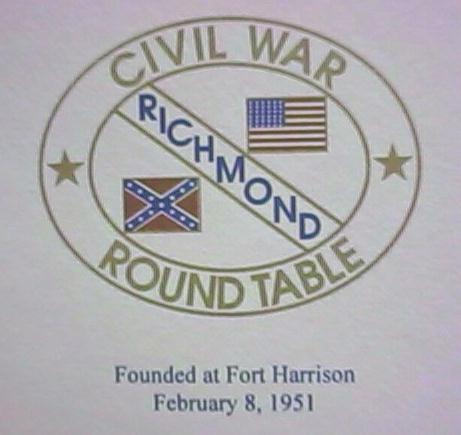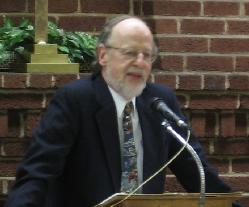


August 2005
rcwrt.org
Richard Forrester, President Rob Monroe, Editor 8008 Spottswood Road 2416 Edenbrook Dr. Richmond, VA 23229 Richmond, VA 23228-3040 dforrester@verizon.net RMonroe500@comcast.net
August 2005 PROGRAM Lt. Gen. Josiah Bunting, III "Gen. Ulysses S. Grant" 8:00 p.m., Tuesday, Sugust 9, 2005, at the Boulevard United Methodist Church, 321 N. Boulevard, Richmond, VA (corner of Boulevard and Stuart Ave.) Please note: This month's meeting will be held in the sanctuary. General Josiah Bunting is a 1963 graduate of Virginia Military Institute where he became Regimental Commander and First Captain of the Corps, was a member of the Honor Court and captain of the swimming team. An English major, he graduated third in his class and was awarded a Rhodes Scholarship. After receiving a B.A. and M.A. from Oxford, where he was President of the American Students Association, he entered the United States Army in 1966. During six years of service, he reached the rank of Major, with duty stations at Fort Bragg, NC; Vietnam (Ninth Infantry Division); and West Point, NY where he was an assistant professor of history and social sciences at the United States Military Academy. His military citations include the Bronze Star with two Oak Leaf Clusters, Army Commendation Medal, Vietnam Honor Medal - 2nd class, Presidential Unit Citation, Parachute Badge, Combat Infantry Badge, and Ranger Tab. Bunting spent a year at the U.S. Naval War College in Newport, RI before being named President at Briarcliff College (NY). He later became President of Hampden-Sydney College, then headmaster of the Lawrenceville School (NJ). He has been president of Phi Beta Kappa at William and Mary and was appointed Superintendent of VMI in 1995. Early in his tenure he was charged by the Institute's governing board to implement the ruling of the United States Supreme Court, to oversee preparations for the enrollment of female cadets. He was promoted to Lieutenant General, in 2002. A sought-after lecturer who holds honorary degrees from several colleges, Gen. Bunting is a member of numerous honor societies and fraternities and has been a trustee of many educational institutions and entities.
Summary of July Meeting
 |
University of Richmond to Offer Course on Civil War Cavalry The University of Richmond's School of Continuing Studies will offer a course titled "Crossed Sabers - Civil War Cavalry in Virginia." Classes meet from 7-9pm on four consecutive Monday nights, beginning on October 3, 2005. The course will discuss the extensive use of mounted soldiers by both sides in many different types of units. The Civil War in Virginia would see large cavalry divisions made up of thousands of cavalrymen and light artillery to small units of irregular forces mounted on swift horses who served to gather information on the enemy or to attack his weak points. This course explores the use of cavalry by both the Union and the Confederacy, highlights the major cavalry battles fought in Virginia between 1861 and 1865, and brings to life some of the fascinating men who led the forces in blue and gray. The instructor will publish a suggested reading list prior to this course and will also provide additional information as take-home material. On Saturday, October 29, a bus field trip led by the instructor will visit selected cavalry battlefields in Virginia. This course is led by retired Brigadier General Jack Mountcastle, the U.S. Army's former Chief of Military History. Discussions will focus on those soldiers who truly believed the lyrics of the popular Civil War song: "If you want to have fun --- J'ine the Cavalry!" Cost of the non-credit course is $159. For details call the University of Richmond's School of Continuing Studies at 289-8133 or visit their website, www.richmond.edu. Click on "Continuing Studies" and then select the "Think Again" noncredit course catalog's section on Personal Enrichment History Courses.
Fall Field Trip Reminder Response has been good so far for the Round Table's fall field trip to Hampton Roads, but there's still room for more. On Saturday, October 1, we will begin our tour at Lee Hall in Newport News and visit several land sites in the morning. After lunch at Fort Monroe, we board the Miss Hampton II and explore the scene of the historic clash between the CSS Virginia and the USS Monitor. Our guide will be John V. Quarstein, Director of the Virginia War Museum and author of "The Battle of the Ironclads." He is an expert on the Civil War on the Virginia Peninsula and a dynamic tour guide. The bus departs at 8am from the James River Bus Terminal at 915 North Allen Avenue (located between Broad and Leigh streets) and will return by 5pm. The cost is $35 per person. Guests are welcome. Please bring your own lunch and drink. Note that security measures at Fort Monroe require that all visitors present a photo ID. If you have questions, please contact Bernie Fisher at (804) 730-1785 or via email, bernard.fisher@comcast.net. Please make checks payable to RCWRT and send along with the form below to: Bernie Fisher 7300 Ann Cabell Lane Mechanicsville, VA 23111 2005 RCWRT Fall Field Trip Date: ______________ Name: _________________________________________________ Address: ____________________________________________________________________ Phone Number: (_____) ______-________ Number of reserved seats: _____ x $35 = $ _______ total (Make check payable to RCWRT)
New "Perpetual" Guidebook Lists Richmond's Civil War Sites A new guide to Civil War sites in Richmond has been published. The 32-page large-format book lists dozens of sites in the former Confederate Capital and locates them on easy-to-use maps. "The Civil War Traveler Guide to Richmond's Civil War Sites" is illustrated with period and modern images. The book will be updated continuously on www.civilwartraveler.com and thus will never go out of date. Generous margins are provided for notes. Cost is $7.95; and it is available at local bookstores and from www.civilwartraveler.com/books. There is no charge for media mail delivery if ordered from the website.
RCWRT Monthly Speakers for 2005
You can receive your newsletter sooner and help the Richmond Civil War Round Table save money by signing up to receive your newsletter via email. To add your name to the list, simply email the editor at RMonroe500@comcast.net Thanks!
To facilitate the printing and timely distribution of the monthly newsletter, information for it should be submitted to the editor no later than the following dates: September newsletter, September 3 October newsletter, October 1 November newsletter, October 29 December newsletter, December 3 Information may be emailed to RMonroe500@comcast.net or Richmond Civil War Round Table Newsletter Rob Monroe, Editor 2416 Edenbrook Dr. Richmond, VA 23228-3040
Return to News Letters Index
Return to main page

©R.C.W.R.T. 2005